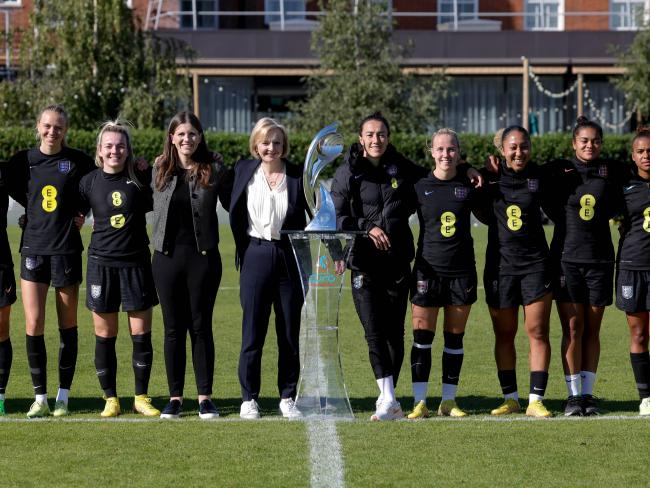20 March 2023

The then prime minster Liz Truss with the England women’s football team, October 2022. Photo Andrew Parsons / No 10 Downing Street via Flickr (CC BY-NC-ND 2.0)
The government chose International Women’s Day, Wednesday 8 March, to announce a new package of measures to promote equal access to sports, especially football, for girls and boys. It’s a welcome step, but more needs to be done for school sport.
Schools would be “asked”, but not required, to offer both sexes a minimum two hours of sport, either during school PE time or as extra-curricular activity. Prime minister Rishi Sunak and education minister Gillian Keegan were effectively compelled to make this promise by the success of the England women’s football team.
Campaign
As winners of the delayed Euro 2022, the Lionesses wanted to build on that victory and the success of the Football Association’s Let Girls Play campaign launched in 2021. Stories emerged from the Lionesses’ changing room of girls forced to play in boys’ teams if they wanted to play at all. And for many of those capable of reaching higher levels, the expense of having to travel across continents to find suitable coaching.
‘An open letter demanded that football should be available to all schoolgirls.’
Arsenal and England defender Lotte Wubben-Moy was determined that the team’s victory should leave a solid legacy. She put to Leah Williamson, her captain, and Sue Campbell, FA director of women’s football, the idea of writing an open letter to the then candidates for prime minister. The letter to Rishi Sunak and Liz Truss was signed by all 23 members of the squad. It demanded, as a start, that football should be available to all girls in school. Currently only 63 per cent have the opportunity.
Driving force
There’s no doubt that Wubben-Moy's initiative, and her follow up with government, was the driving force behind the announcement. The package amounts to £600 million for schools over the next two years, plus £22 million for the 450-strong School Games Organisers network benefitting over 2 million children.
Guidance this summer will advise school heads about how the money should be spent: teacher training should be a priority. It is also expected that a widening range of sports will be on offer, including football, tennis, cricket and hockey. But funding is only for a limited period, up to the end of the summer term 2025.
Inadequacy
The government’s opportunism and fine words mask an underlying inadequacy in the way sport is delivered in Britain. The uncertainty of achieving universal access across a range of sports is exacerbated by the cost of living crisis. For most working class children the only sport they get is at school.
The government already had strategies and plans about school sport, as well as evidence about the level of children’s physical activity. These don’t seem to have been making much impact.
A report launched just before the pandemic in 2020 called on the government to give greater recognition to sport in the community. Two broadcasters and a former footballer set up the Chiles Webster Batson Commission on Sport and Low Income Neighbourhoods. Its findings point to the connection between poverty and low participation in sports such as tennis and rugby, and to the prohibitive cost of gym membership.
Grassroots
The community games culture – street games – the grassroots from which many professional footballers originate, gets little if any support from government. Outdoor space is being swallowed up. Short term top-down funding means no planning for the long term and little local control.
Community funds were burned through during the pandemic. The competitive process of applying for funding was itself a drain on resources: committed volunteers offering sport as a way to tackle youth crime, anti-social behaviour, and mental illness, found themselves diverted into fundraising activities.
No choice
Ministers will take the credit for improving sports access. The reality was that with the Lionesses adding their voice to that of numerous campaigning bodies, the government had no choice but to bow to pressure.
This demonstrates how elite athletes and professionals everywhere can use the strength of their position to fight for the wider working class. But as Wubben-Moy said after the announcement, “This is just the beginning.”
